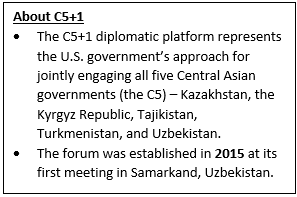SYLLABUS
GS-2: Bilateral, regional and global groupings and agreements involving India and/or affecting India’s interests.
Context: Recently, the US President announced that Kazakhstan will join the Abraham Accords.
More on the News
• Kazakhstan has officially agreed to join the Abraham Accords during the C5+1 Summit 2025.

• The Abraham Accords were initiated by Donald Trump in 2020, and four Muslim-majority countries — the UAE, Bahrain, Morocco, and Sudan — had already joined.
• Kazakhstan’s inclusion, along with possible future signatories like Azerbaijan and Uzbekistan, represents the first major expansion of the accords into Central Asia.
Key Reasons for Joining the Abraham Accords
• Multi-Alignment Policy: Joining the Accords is a symbolic yet strategic move aimed at balancing relations with Russia, China, and the U.S., consistent with Kazakhstan’s multi-vector foreign policy.
• Act of Balancing: Analysts view it as a low-risk way to strengthen indirect ties with the U.S., while still being part of the Shanghai Cooperation Organisation (SCO), maintaining equilibrium between global powers.
• Costless formality: Kazakhstan already has full diplomatic relations with Israel. The move to join the Abraham Accords appears largely symbolic and a diplomatic tool to align more visibly with U.S.-led initiatives.
U.S. Perspective
• The U.S. sees Kazakhstan’s inclusion as a geopolitical and economic opportunity to expand its influence in Central Asia, a region dominated by Russia and China.
• It advances U.S. goals of diversifying energy and mineral supply chains, crucial for clean energy technologies and defence manufacturing.
• The accords represented a strategic move to counter Iran’s regional influence and strengthen alliances between pro-Western states.
• The move also revives and legitimises the Abraham Accords project post-2023 Gaza conflict, reaffirming U.S. commitment to Middle East diplomacy.
About the Abraham Accords
• The Abraham Accords are a set of U.S.-brokered agreements initiated under President Donald Trump in 2020 that enabled formal diplomatic normalisation between Israel and several Arab states.
- Initial signatories in September 2020 included the United Arab Emirates and Bahrain. They were followed by Morocco and Sudan.
• The Accords marked a major shift in Middle Eastern geopolitics, as Arab nations, after decades of hostility, formally recognised Israel, breaking their longstanding political and diplomatic isolation.
• They were designed to promote peace and stability in the Middle East by fostering cooperation between Israel and moderate Arab nations.
UPSC Mains Practice Question
Discuss the geopolitical significance of Kazakhstan’s decision to join the Abraham Accords. How does this development reflect the changing dynamics of U.S. influence and regional alignments in Central Asia?

